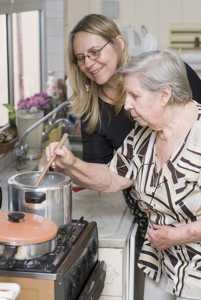Who Are Caregivers, and How Do They Support Cancer Survivors?

A caregiver is a person who provides help and care to someone who has been diagnosed with cancer. Cancer survivors may get help from caregivers with regular day-to-day tasks, such as household chores, as well as tasks related to their cancer, such as coordinating treatment and follow-up care with health care providers. Caregiving relationships can be formal or informal.
Formal caregivers are trained and paid to provide care, such as nurses, therapists, social workers, and home health aides. Formal caregivers may work for home care agencies, community or social service agencies, or for-profit providers.
Informal caregivers provide unpaid care out of love, respect, or friendship. Some examples of informal caregiving relationships are—
- Adult children caring for parents.
- Parents or grandparents caring for a child with cancer.
- A spouse or partner caring for his or her spouse or partner.
- A neighbor or close friend caring for the cancer survivor.
The types of care that informal caregivers provide ranges from simple, occasional tasks, like driving the cancer patient to the doctor, to full-time care. The demands on caregivers often change over time. Some of the types of help caregivers provide include—
- Cooking, cleaning, and other household chores.
- Running errands such as buying groceries and getting prescriptions filled.
- Helping the cancer patient bathe, get dressed, use the bathroom, eat, and take medicine.
- Paying bills and filing insurance claims.
- Providing encouragement and support to the survivor, and helping him or her stay in touch with friends and family members.
- Telling the doctor if the survivor gets worse or has side effects from treatment.
Researchers are studying the roles caregivers play in supporting survivors, and the challenges and benefits associated with caregiving, so they can suggest ways in which caregivers can be supported.
Learn how caregivers help survivors find information and make medical decisions, support survivors’ physical and mental health, and help address survivors’ work and financial concerns.
- Page last reviewed: May 31, 2017
- Page last updated: April 20, 2016
- Content source:
- Maintained By:


 ShareCompartir
ShareCompartir